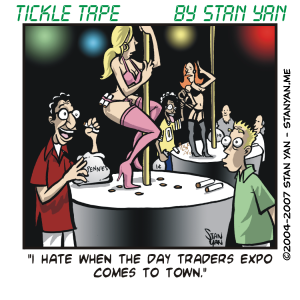If you’re like most traders, you struggle with losses. Your emotions play tug of war in your mind. Losses are a fact of trading, however. Even the best setups and the most reliable methods are not foolproof. Market conditions change, and the method fails. Your mindset isn’t just right, and you make a few trading mistakes. There are many reasons for trading losses.
In the ever-changing markets, one must learn to accept losses, and just move on. But that’s much easier said than done. It’s easy to say that one should be ruthlessly detached, trading the markets in a cold and calculating way. But the fact is that when you face a string of three consecutive losing trades, for example, it’s hard to just put it completely out of your mind. Somewhere in the back of your mind, you’re thinking, “I’m losing money here; can I really put up with a few more losing trades and still survive?”
Depending on your experience, the answer to this question can range from, “I know it’s just a temporary setback” to “I have a strong suspicion I’m washed up.” If you’re the type of person who has trouble truly believing that you can accept a drawdown with a happy-go-lucky attitude, you’re not alone. There are actually many traders who do, indeed, have trouble just shrugging off a loss, especially novice traders.
They persistently mull over the loss, playing it over and over again in their heads until they find themselves in a bad mood, which intensifies as they continue to mull over their losses. Some people can’t stop and because they can’t, they are less satisfied and confident. They have trouble committing to trading plans compared to non-ruminators. They are so wrapped up in rumination that they can’t think clearly or solve problems easily. Such an approach isn’t conducive to skilful trading, however, were a calm, relaxed, and focused problem-solving approach is crucial.
People differ on the extent to which they ruminate. Some people don’t ruminate at all; they avoid thinking about losses or failure, or they vent their disappointment and frustration to friends and confidants in order to feel better. Whatever strategy they use, they don’t dwell on their failures very long. They just accept them and move on. Ruminators, in contrast, repeatedly focus on the meaning, causes, and consequences of their bad moods. But sometimes after a losing trade, there is no meaning to glean.
It doesn’t help to feel paralyzed by over-analysis. It’s imperative to learn to accept losses and just move on. If you are stuck mulling them over and over in your head, you can’t move forward. If you’re a ruminator, it’s essential that you gain awareness of it, and make every effort to minimize its influence. Self-awareness is the key to the solution. Once you know you have a problem with rumination, self-monitor it, gain awareness of it, and develop a plan to manage it. It’s not easy to change since you’ve probably developed the habit of ruminating over many years, but this tendency can be controlled.
Carefully monitor your thought processes, and when you find yourself ruminating, remind yourself that by doing so, you will intensify your bad mood and that in turn, will interfere with your concentration, and reduce your ability to think of creative solutions to trading problems. Some psychologists suggest that ruminative people should immediately yell, “stop” when they find themselves ruminating. This usually halts the repetitive and incessant need to over-analyze a problem or failure. In contrast to a non-ruminator, questioning one’s decisions and over-analyzing them isn’t productive, and it is necessary to remind oneself that he or she is making no progress by doing so.
Over time, and through practice, it’s possible for a ruminator to take quick and decisive action, instead of being paralyzed by a recent trading loss. So if you are a ruminator, don’t make trading losses worse by dwelling on them too much. Keep in mind that even the best traders must face losses, and oftentimes, there isn’t much to learn from a trading loss. Don’t overanalyze. Just accept the loss, control your risk, and keep moving forward. If you’re using a reliable trading strategy, it will “kick in” eventually and the law of large numbers will work in your favour if you make enough trades.
All you have to do is keep moving forward, rather than needlessly worrying. If the method is unreliable, worrying about it isn’t going to help matters. Find a new method if you need to, but whatever you do, stop ruminating.


